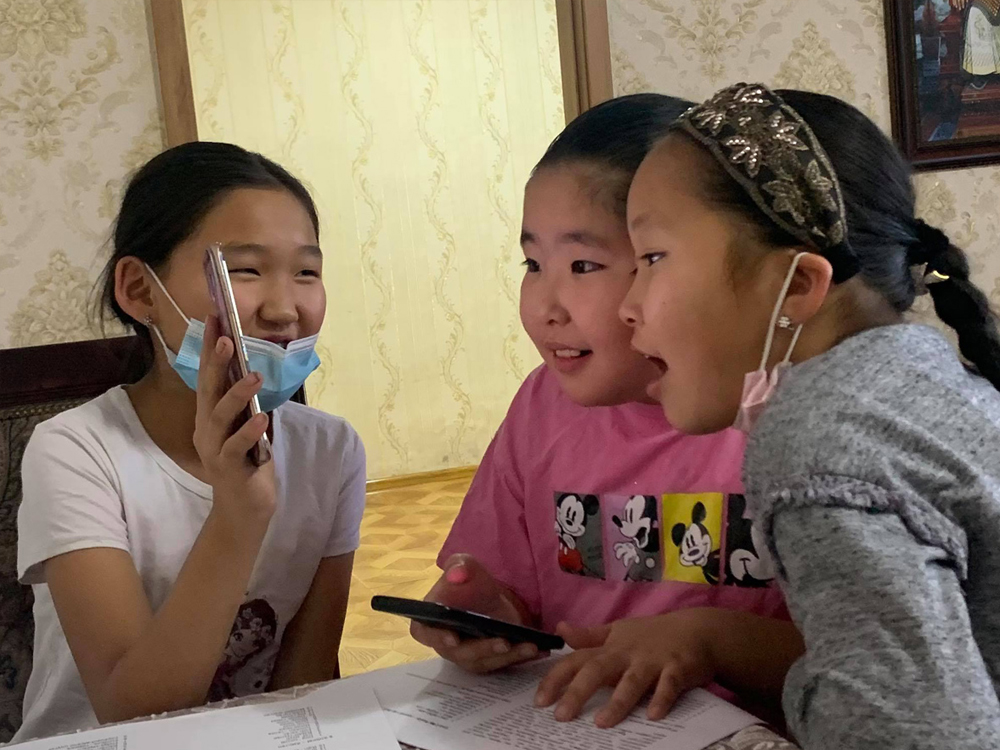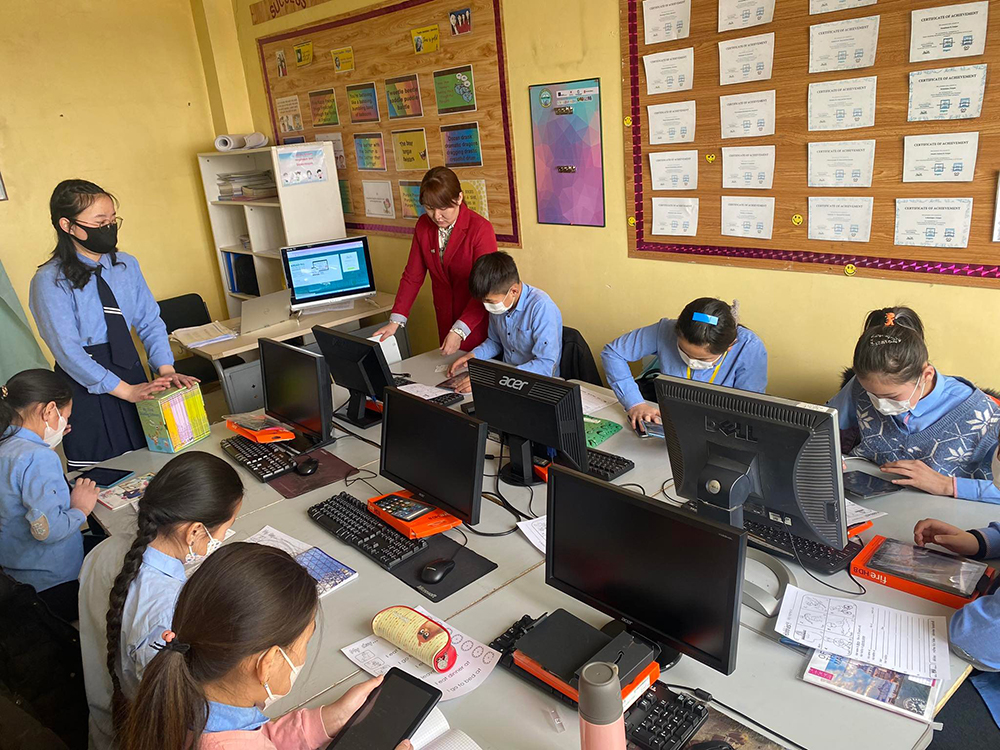Ts. Purevsuren: Not only the students, but also the teachers have learned and developed a lot

As part of the “Entrepreneurship-Focused Socio-Emotional Skills for The Most Vulnerable Youth in Rural Mongolia” project, Save the Children is featuring success stories of project teachers/counselors, graduates, and business coaches in a series. This time we present the story of Ts. Purevsuren, a teacher/counselor with the ESEL program in Uvurkhangai province. With generous funding from the Japan Social Development Fund and under the management of a World Bank, this four-year project prepares 6,000 children and youth in 25 soums of Khovd, Zavkhan, Uvurkgangai, Gobisumber and Sukhbaatar provinces in Mongolia for future employment.
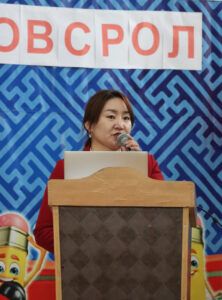 A story of becoming a teacher/counselor
A story of becoming a teacher/counselor
In 2021, the project developed an innovative training program “Entrepreneurship-Focused Socio-Emotional Learning (ESEL)”, aimed at providing socio-emotional skills and entrepreneurship education for local children and youth, and trained teachers/counselors in target areas. Ts. Purevsuren, a teacher at General Secondary School No. 2 in Uyanga soum, Uvurkhangai Province, is one of the first teachers/counselors trained to implement this program, which is being carried out for the first time in Mongolia. She has been working as an English teacher for 15 years and saw the ESEL as an opportunity to learn something new and develop professionally, so she submitted an application essay and was selected for the program to be trained as a teacher/counselor.
Since she teaches a social science subject, it was easy for her to study and guide her students on topics such as personal and socio-emotional skills taught in the ESEL program. The second part of the program, which focused on entrepreneurial skills, was completely new to her, and she gained knowledge in business and finance, such as writing a project proposal and understanding profitability and risk. In the spring of 2020, when the ESEL program accepted the first round of applicants in Uvurkhangai Province, 71 students applied to participate in the program, and 48 students were selected for the program by dividing them into two groups. Ts. Purevsuren taught 24 students in one group.
Although the program was conducted under quarantine restrictions imposed due to the spread of COVID-19, she fully delivered the training content to the participants by relying on blended learning, which combines face-to-face learning with online technological tools.
Students prepared by Purevsuren received funding grants for their micro-projects
Upon completion of the ESEL, the project provided a great opportunity for participants to receive seed funding to kickstart their small projects. Realizing that this would help her students test and implement their newly acquired knowledge and skills, Purevsuren prepared 15 students for this grant program. Her students were divided into four teams and submitted 4 different project proposals. All four projects passed the first round of the competition and participated in the second round, which was a great success for the teacher. As a result of the fierce competition at the province level, the “English Library” project met the criteria to receive MNT 2.8 million (about $ 900) in funding and began implementation at the second general secondary school in Uyanga soum. The selected project team consists of three students in grades 10, 11, and 12.
Preparing her ESEL students for the “Entrepreneurship Seeds”, a micro-project funding competition required different skills from her, Purevsuren said. During the preparation, students gained knowledge and skills such as teamwork, developing new business ideas, writing a business plan, turning ideas into projects, public speaking, financial literacy, creativity, and improving their digital literacy skills. Splitting into teams and taking responsibility for other members can also help students become more responsible, she observed.
The microproject developed by the students of the ESEL program is now being implemented
Purevsuren is more than happy that the “English Library” project is being implemented in her school by her students and benefiting many. The “English Library” project aims to motivate students to read regularly by using Kindle readers with more than 1,000 books that are not harmful to children’s eyes, and teach students how to use the latest technology, to keep students motivated to learn languages. The future goal of the project is to create an environment that allows students to learn the language by establishing an English library at their school that combines print books with e-books to meet the needs of each child.
School administration staff noted that the implementation of the “ENGLISH MINI LIBRARY” project, which aims to improve student’s English skills, not only has a positive impact on students’ academic performance but also provides important opportunities for students to spend their free time productively, learning to work as a team and improving their personal development skills.
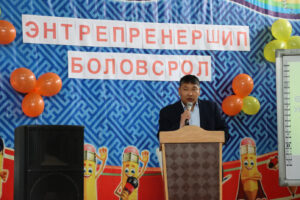 B.Bayarmagnai, Principal of the 2nd General Secondary School of Uyanga soum, stated, ‘Foreign language is an important subject that should be taught to students along with the unique culture and tradition of the country, so we need to apply innovative methods and techniques for language teaching. In this sense, on behalf of all students, teachers, and parents, I would like to express my gratitude to the students and teachers of the “Mini Library” project team for providing innovative ways to improve English skills for students in soum schools that do not have language laboratories and lack the latest equipment.”
B.Bayarmagnai, Principal of the 2nd General Secondary School of Uyanga soum, stated, ‘Foreign language is an important subject that should be taught to students along with the unique culture and tradition of the country, so we need to apply innovative methods and techniques for language teaching. In this sense, on behalf of all students, teachers, and parents, I would like to express my gratitude to the students and teachers of the “Mini Library” project team for providing innovative ways to improve English skills for students in soum schools that do not have language laboratories and lack the latest equipment.”
As of March 2022, 12 5th grade students, 10 6th-7th grade students, 6 12th grade students, and a total of 28 students were regularly using the Kindle devices available in the online library of the school. In addition, more than 100 students attended the public reading and actively participated in the discussion on constructive reading. The students are happy about the English library initiated by their classmates. One of them, D.Byambajargal, a 12th-grade student, said, “We participated in the training offered by the English Mini Library project and practiced our reading skills. Reading is the most difficult part of the English test, which is part of the General Entrance Exam. Reading books constructively using the Kindle devices and talking about what we read helps us to acquire knowledge. Daily reading effectively improves our vocabulary and helps us develop our reading skills. I would like to thank my classmate B.Zagarsuren and the other team members of the “Mini Library” project and my teacher Ts. Purevsuren for giving us the opportunity to develop together.”
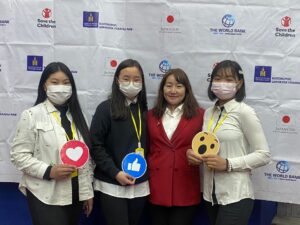 Looking back on positive changes at the school and among her students, Purevsuren is excited to participate as an ESEL teacher/counselor in the “Entrepreneurship-Focused Socio-Emotional Skills for The Most Vulnerable Youth in Rural Mongolia” project. “I am thankful to the World Bank, Japan Social Development Fund, and Save the Children for providing me the opportunity to work as a teacher/counselor, learn from each other, and collaborate. I wish them and everyone who works for children great success!”
Looking back on positive changes at the school and among her students, Purevsuren is excited to participate as an ESEL teacher/counselor in the “Entrepreneurship-Focused Socio-Emotional Skills for The Most Vulnerable Youth in Rural Mongolia” project. “I am thankful to the World Bank, Japan Social Development Fund, and Save the Children for providing me the opportunity to work as a teacher/counselor, learn from each other, and collaborate. I wish them and everyone who works for children great success!”
The story was developed by Battsetseg Goitiiz, Program Coordinator of Save the Children in Uvurkhangai province, and edited by Delgermaa Altangerel, Media and Communications Officer at Save the Children.



